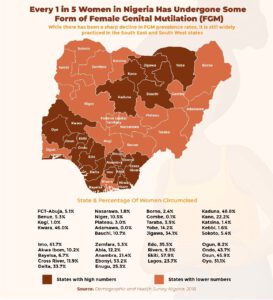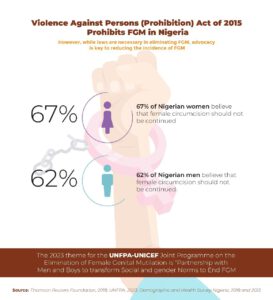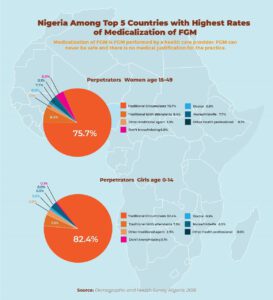Nigeria has made strides in the reduction of FGM, but it remains widespread, with a significant percentage performed by healthcare professionals, despite overwhelming medical evidence and legal measures against it. In this report, Emiene Erameh looks into the culture that sustains the harmful practice and what it will take to break the grip.
When Amara, a native of Ebonyi State, was 16 years old, her mother told her that she had undergone female genital mutilation when she was only eight days old. Amara, who is now 25, said her mother explained that female genital mutilation (FGM) was part of their community’s deeply-held traditions, done to keep girls from becoming promiscuous when they became young women.
“She said that using health personnel to carry out the procedure came with fewer risks of infection.
She was confident that by not using local midwives, she was doing the right thing,” said Amara, whose mother took her to a clinic where a nurse mutilated her genitals.
An estimated 200 million girls and women worldwide have undergone a form of FGM, which is the removal of part or all of the external genitals or injury to the genital organs for non-medical reasons, according to UNICEF. Many undergo FGM before the age of 15. In Nigeria, the prevalence of FGM is highest in the South East (35%) and South West (30%) and lowest in the North East (6%). In Imo, which has the highest rates of FGM, 62% of women have undergone FGM, compared with less than 1% of women in Adamawa and Gombe, according to data from the Nigeria Demographic and Health Survey Nigeria, 2018. Four per cent of girls aged 0 to 14 years had their genital area sewn closed, as compared with 6% of girls and women aged 15-49 years.
 r
r
Most FGM is performed by traditional circumcisers, with data from the Demographic and Health Survey showing that in four out of five girls and women (82% of girls and 76% of women), FGM was performed by traditional circumcisers. Traditional birth attendants performed FGM on eight out of 100 girls and women, respectively.
On the other hand, for seven in 100 girls and nine in 100 women, FGM was done by medical professionals, with nurses and midwives performing the most FGM (7% for girls and 8% for women).
According to UNFPA, medicalised FGM is done by any category of healthcare provider, whether in a public or private clinic, at home or elsewhere. It includes the procedure of re-infibulation (sewing the external labia back together after de-infibulation) at any point in a woman’s life. During infibulation, a form of FGM, the clitoris and labia are cut off and stitched together. De-infibulation is when the scar tissue that formed is cut, for instance during childbirth.
The World Health Organisation (WHO) defines FGM as comprising all procedures that involve partial or total removal of the external female genitalia, or other injury to the female genital organs for non-medical reasons. Therefore, as UNFPA observes, while FGM done in clinical settings might confer a sense of legitimacy or give the impression that there are no health consequences, having medical personnel perform FGM does not reduce the harmful effects of the procedure.
In 2006 when researchers surveyed nurses in Edo State on their knowledge, attitude and practice of FGM, the majority – eight in 10 or 83% – cited cultural reasons; half said they also did it for financial gain, and one in four said they performed FGM to prevent girls and women from going to traditional cutters.
The researchers noted that communities see FGM as an integral part of their tradition and cultural identity, which sustains the practice. They believe that it increases sexual pleasure in men and increases women’s fertility, the ability to procreate and ensures child survival.
More than 10 years later, in 2018, another study observed that culture was still a major factor in cases of health workers performing FGM. The researchers noted that health workers shared the same beliefs as members of their community on the supposed benefits of FGM. Moreover, there was perceived approval (or lack of disapproval) by their professional peers.
In 2020, UNICEF reported that Nigeria is one of the five countries with the highest rates of FGM medicalisation, with a prevalence of 12.7% among girls and women aged 15 to 49 years. However, prevalence has fallen from nearly three in 10 (26.9%) in 2013 to about one in 10 (7.1%) in girls aged below 14 years. Among girls and women aged 15 to 49 years, medicalised FGM decreased from 11.9% to 8.6%. The overall prevalence of FGM among girls and women aged 15 to 49 years also dropped from one in four (24.8%) in 2013 to one in five (19.5%) in 2018, according to an analysis by UNFPA.
UNFPA said that the reduction in medicalisation could be because of improved awareness of laws and policies on FGM among health workers, health system-related interventions, value clarifications among health professional organisations and documented opposition to the medicalisation of FGM and training of health workers on FGM prevention by the Society of Gynaecology and Obstetrics of Nigeria (SOGON) in 2015. It could be argued that the decrease in the medicalisation of FGM has seen women take up traditional means of cutting as seen in the increased proportion of FGM performed by traditional circumcisers.
Despite a decrease, the proportion of medicalisation continues to be substantial, and though the proportion of FGM performed by nurses/midwives has reduced from 24.3% in 2003 to 7.7% in 2018, they continue to contribute the highest proportion to medicalisation.
MEDICAL AND PSYCHOLOGICAL EFFECTS
Oliver Ezechi, Director of Research at the Centre for Reproductive and Population Health Studies at the Nigerian Institute of Medical Research, Lagos, says FGM has severe and lasting consequences for the physical health of girls and women, and that removing or altering healthy genital tissue leaves them vulnerable to a range of immediate and long-term complications.
“Chronic pain is a common complaint among survivors, particularly during sexual intercourse and menstruation. The removal of sensitive genital tissue, including the clitoris, can result in reduced sexual sensitivity and pleasure, leading to sexual dysfunction. Scarring and the formation of keloid tissue can further contribute to pain and discomfort,” he explains.
Amara, confirmed this experience, saying that when she became sexually active, she experienced unbearable pain during intercourse.
“No amount of foreplay was able to help me. I feel very bad about it … I feel worse when I discuss it with my friends and I realise their experience is different,” she said.
“I often feel incomplete and inadequate and it is really bad because it can’t be reversed,” she added.
Dr Olusegun Shoyombo, a consultant psychiatrist with the National Hospital, Abuja, says that FGM affects sexual satisfaction, which can leave women feeling incomplete or inadequate. The trauma of
FGM also affects them, leading to anxiety and depression, which affects their lives, including their ability to enjoy sex and have a healthy sex life.
“They might experience sexual dysfunction which creates anxiety related to sexual activity. So, you have done this act that is supposed to promote sexual purity within the confines of a marriage relationship, but it has caused a problem where sex itself is painful for the woman. So every time there is anticipation that there might be sexual activity, the person becomes very anxious and may Have an aversion to it.”
Besides painful sex, Professor Ezechi says that women who have undergone FGM are at risk of obstetric complications. The narrow vaginal opening can obstruct the passage of the baby during childbirth, increasing the likelihood of prolonged labour, perineal tears, and the need for an episiotomy. These complications can result in postpartum haemorrhage, infection, and obstetric fistulas, a hole between the birth canal and the bladder or rectum.
“Obstetric fistulas often lead to chronic incontinence, social isolation, and psychological distress,” he explains.
Coincidentally, Nigeria has one of the highest rates of fistula (40%) and UNFPA Nigeria observes that FGM may explain as many as 15% of fistula cases in some parts of Africa.
The psychological effects of FGM should also not be underestimated.
“Survivors may experience a range of psychological disorders, including post-traumatic stress disorder (PTSD), anxiety, depression, and disassociation. The trauma associated with the procedure can have lifelong effects, affecting a woman’s self-esteem, body image, and overall mental well-being. The violation of bodily autonomy and the cultural normalisation of FGM can lead to feelings of shame, guilt, and a diminished sense of identity,” says Professor Ezechi.
To protect girls and women from this and other harmful traditional practices which are a form of gender-based violence, Nigeria passed the Violence Against Persons (Prohibition) (VAPP) Act in May 2015. Section 6(1) of the VAPP Act prohibits circumcision or genital mutilation of girls and women and Section 6 (2) criminalises and prescribes punishment for anyone who performs or engages another to perform female circumcision or genital mutilation. Section 6(3) criminalises and prescribes punishment for anyone who attempts to perform or engage another to perform FGM.
Finally, Section 6(4) criminalises and prescribes punishment for those who incite, aid, abet or counsel another to perform or attempt to perform FGM.

Anyone found guilty of performing FGM or engaging another person to perform FGM is liable to a jail term of four years or a fine not exceeding 200,000 Naira. On the other hand, performing FGM or engaging a person to perform FGM carries a jail term of two years or a fine not exceeding 100,000 Naira or both. Moreover, the law states that anyone who incites, aids, abets or counsels another person to perform FGM or to engage another person to perform FGM is liable to a prison term of not more than two years or a fine not exceeding 100,000 Naira or both.
Before the VAPP Act, there was no Federal law criminalising the practice of FGM in the country.
However, several states had already enacted laws to deal with violence against women and girls and to criminalise FGM. They include Bayelsa State which has the FGM (Prohibition) Law (2004), Cross River State with the Girl-Child Marriages and Female Circumcision (Prohibition) Law (2000), and Ebonyi State with the Law Abolishing Harmful Traditional Practices Against Women and Children (2001). Edo State, enacted the Prohibition of Female Genital Mutilation Law (1999), Enugu State, has the FGM (Prohibition) Law (2004), and Rivers State has the Child Rights Act (2009). The VAPP tracker shows that three states – Zamfara, Katsina and Kano – have not passed the VAPP law, while Taraba, a fourth, passed the law but the governor hasn’t assented to it. This, says Dunia Tegegn, a human rights lawyer and gender activist, in a commentary published in AfricLaw, provides loopholes for people to move children to these states for FGM because they have no law prohibiting it. The VAPP Act is a federal law, only effective in the Federal Capital Territory of Abuja, so states have to pass mirroring laws.
Despite the harms associated with FGM and its prohibition in most states, there have been few convictions for practitioners of FGM. In 2016, a report on FGM by The Reuters Foundation and 28 Too Many noted, “It has not been possible to identify any prosecutions brought under the VAPP Act in Nigeria since its introduction in 2015. The most recent report published by the UNFPA-UNICEF Joint Programme did not list any arrests, cases or convictions for FGM in Nigeria during 2016.”
Additionally, a policy note on FGM in Nigeria by the British Government observed that there were no criminal prosecutions or convictions of FGM perpetrators between June 2018 and March 2021.

However, in 2021, UNICEF reported that since 2018, there have only been seven arrests, seven cases brought to court and zero convictions or sanctions. This indicates that there needs to be better tracking of data showing the cases taken to court and their outcomes.
Anti-FGM advocates, however, say the law alone, while necessary, is not enough. FGM persists because of the cultural and patriarchal beliefs that prop it up. Nkechi, an FGM survivor from Ebonyi State, was told that nobody would marry a woman who is not cut and that FGM boosts fertility and helps during childbirth. She has come to learn that these are myths that only serve to hold up a harmful practice.
“It’s a lie because you see many women who were cut experiencing complications during childbirth,” she said.
The defining moment was when someone who had not been cut gave birth without any assistance contrary to commonly-held beliefs.
“There was a lady who refused to be cut and was told she would never have children, but funny enough she got pregnant and had an easy pregnancy and, on the day she gave birth, she had just come back from the farm and entered her room and had her baby. She only called for help to clean up. That is when I knew we had been scammed,” said Nkechi.
ADVOCACY KEY TO ENDING FGM
Dr Christopher Ugwu, Executive Director of the Society for the Improvement of Rural People (SIRP), a civil society organisation working to end FGM through social and behavioural changes in Nigeria, with a focuson Enugu State, says advocacy is the key to reducing the incidence of FGM.
“Use of non-judgmental, open dialogue ensures that we have an open, non-judgmental, and constructive discussion with various community members which has helped in driving down the numbers,” he said, citing DHS data that showed a drop from 40.3% in 2013 to 25.3 in 2018.
This approach includes engaging with health workers to sensitise them about the dangers of the practice. Another approach SIRP has adopted is involving men, especially in deeply patriarchal communities, and sensitising them to respect the rights of women and girls.
This article was produced with the support of the Africa Women’s Journalism Project (AWJP) in partnership with the International Center for Journalists (ICFJ) and with support from the Ford Foundation.